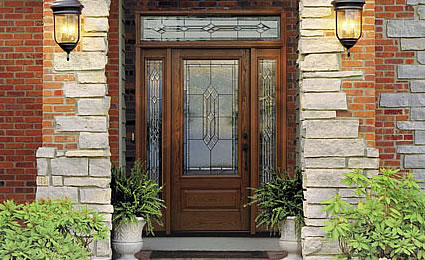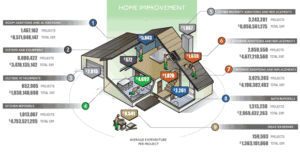Once you buy a home, there will be constant upgrades to it. Numerous home improvement practices will be implemented. Upgrading your home is an ongoing process that you cannot overlook or avoid. As the name suggests, home improvement enhances several aspects of your home — aesthetic, structural integrity, energy savings, etc. Let us look at some home improvement tips to save energy and also money!

Whether you want to tackle some of these yourself or hire a professional to help you, that’s your call. But here are eight great home improvement tips to save energy which translates into paying less out of your bank account.
1. Install Energy Efficient Windows and Doors
Check for air leaks, holes, cracks, and drafts at home, especially in the joints of windows and doors. Seal them with weather stripping or caulk. Check the electric outlets for air leaks. Opt for energy-efficient doors and windows such as low-emissivity or double-paned windows that keep hot air out of your home during summer. Further, insulated windows prevent heat transfer in winter, keeping the house warm without wasting any energy.
2. Insulate and Seal the Attic
Attic insulation and ventilation is important. If it isn’t ventilated properly, the conditioned air will be wasted and it will make the attic super-heated when the air tries to escape through the roof. This will make the AC work harder to cool down a room, increasing energy consumption. Make sure there is no leakage in the attic.
3. Prepare the Basement
Insulate your basement for energy savings and make sure that it is protected from mold growth, moisture, and any kind of structural damage. Check for exposed pipes and carry out the necessary plumbing measures required for it.
4. Evaluate the Health of Duct-work
Ducts are responsible for carrying the conditioned air throughout the house. If there is any leakage, there will be energy loss and a dip in efficiency. Cleaning and maintaining the ducts is extremely crucial. A professional inspection will determine if there is any leakage and if air sealing is required or not.
5. Install a Programmable Thermostat
A programmable thermostat helps you cut energy consumption by at least 10%. You can adjust the temperature with precision and turn off the HVAC system even when you are not home, in instances where you forgot to turn it off before leaving home. Programmable thermostats have the ability to learn the previous settings and adjust the current settings if there is a deviation and some are even capable of analyzing the outside temperature and setting a suitable temperature inside the home, making it really comfortable without wasting too much energy.
6. Use Renewable Energy
Using renewable energy will undoubtedly minimize your dependency on energy through electricity, fuel, etc. Practices like installing solar panels at home and harvesting rainwater will go a long way in saving money and energy.
7. Switch Old Equipment with New
The efficiency of equipment drops as it ages. When any heating or cooling component of the HVAC system is inefficient, it will take longer to either heat or cool the room, or it will consume more energy. Check the lifespan of your equipment and replace them with new ones when they are almost ‘dying’. New instruments such as thermostats will not only be energy efficient but also help in saving money.
8. Have a Cool Roof
Avoid having dark roofs or roofs made of materials that will absorb sun rays and make your home really warm. Install heat-absorbing membranes or layers on your roof. Roofs made of metal, wood, and shingles can be made cool. A typical cool roof will raise the thermometer only to about 100 degrees Fahrenheit.
You can install storm windows, high-efficiency water heaters, and smart power grids to further save energy. Analyze the energy consumption throughout your house and check if there is energy wastage through any equipment. Plan and prioritize the kind of home improvement techniques you need to implement at your home. Moreover, home improvement plans will keep your home maintained, which helps in increasing your property value. Undoubtedly, it is an investment worth considering.
Hope you have enjoyed these home improvement tips to save energy and money. Check back often for more great advice for homeowners.



